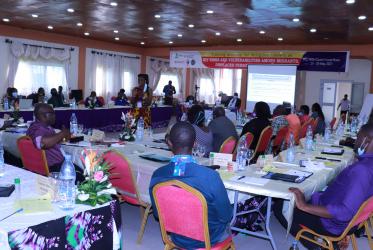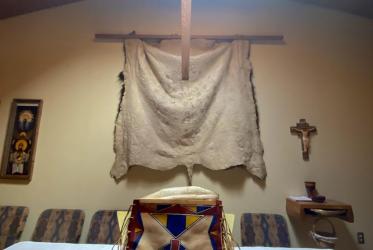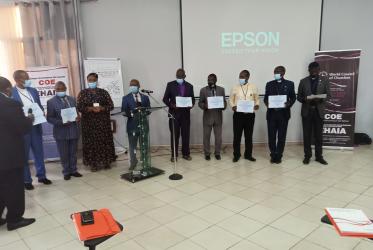Bible Studies on the Pilgrimage of Justice and Peace
"Pilgrimage as Solidarity" (Ruth 1:1-22)
By Yolanda Pantou*
1 In the days when the judges ruled, there was a famine in the land, and a certain man of Bethlehem in Judah went to live in the country of Moab, he and his wife and two sons. 2 The name of the man was Elimelech and the name of his wife Naomi, and the names of his two sons were Mahlon and Chilion; they were Ephrathites from Bethlehem in Judah. They went into the country of Moab and remained there. 3 But Elimelech, the husband of Naomi, died, and she was left with her two sons. 4 These took Moabite wives; the name of the one was Orpah and the name of the other Ruth. When they had lived there about ten years, 5 both Mahlon and Chilion also died, so that the woman was left without her two sons and her husband.
6 Then she started to return with her daughters-in-law from the country of Moab, for she had heard in the country of Moab that the Lord had considered his people and given them food. 7 So she set out from the place where she had been living, she and her two daughters-in-law, and they went on their way to go back to the land of Judah. 8 But Naomi said to her two daughters-in-law, “Go back each of you to your mother’s house. May the Lord deal kindly with you, as you have dealt with the dead and with me. 9 The Lord grant that you may find security, each of you in the house of your husband.” Then she kissed them, and they wept aloud. 10 They said to her, “No, we will return with you to your people.” 11 But Naomi said, “Turn back, my daughters, why will you go with me? Do I still have sons in my womb that they may become your husbands? 12 Turn back, my daughters, go your way, for I am too old to have a husband. Even if I thought there was hope for me, even if I should have a husband tonight and bear sons, 13 would you then wait until they were grown? Would you then refrain from marrying? No, my daughters, it has been far more bitter for me than for you, because the hand of the Lord has turned against me.” 14 Then they wept aloud again. Orpah kissed her mother-in-law, but Ruth clung to her.
15 So she said, “See, your sister-in-law has gone back to her people and to her gods; return after your sister-in-law.” 16 But Ruth said,
“Do not press me to leave you
or to turn back from following you!
Where you go, I will go;
where you lodge, I will lodge;
your people shall be my people,
and your God my God.
17 Where you die, I will die—
there will I be buried.
May the Lord do thus and so to me,
and more as well,
if even death parts me from you!”
18 When Naomi saw that she was determined to go with her, she said no more to her.
19 So the two of them went on until they came to Bethlehem. When they came to Bethlehem, the whole town was stirred because of them; and the women said, “Is this Naomi?” 20 She said to them,
“Call me no longer Naomi,
call me Mara,
for the Almighty has dealt bitterly with me.
21 I went away full,
but the Lord has brought me back empty;
why call me Naomi
when the Lord has dealt harshly with me,
and the Almighty[e] has brought calamity upon me?”
22 So Naomi returned together with Ruth the Moabite, her daughter-in-law, who came back with her from the country of Moab. They came to Bethlehem at the beginning of the barley harvest.
During discussions of the focus group on the Pilgrimage of Justice and Peace, the topic of immigration and refugees arose as a phenomenon faced by the world today. It is a phenomenon as old as human history, yet it has become a prevailing issue in our contemporary world, where many times bureaucracy and a sense of belonging to a certain identity become more important than human welfare, and the newcomers are seen with suspicion and prejudice.
What we would like to see in this Bible study is how immigration shares many similarities with pilgrimage, and how immigration can turn into a pilgrimage of faith if we give new meanings to it. We will also learn that in many cases both immigration and pilgrimage are not always planned journeys, but rather reactions to certain situations.
In this Bible study, we learn from the story of Ruth, someone who chose to immigrate as a form of solidarity with Naomi, the less-fortunate one. Here, we shall see how a journey of migration can change someone’s beliefs, values, and path of life.
Reflection
Similarities abound between pilgrimage and immigration, whether forced or voluntary. Sometimes immigration can be understood as a pilgrimage, sometimes a pilgrimage of faith manifests itself in the form of immigration. When people emigrate from their homeland to a new place, it involves a form of faith: going to a place unknown, just as Abraham once did. Our text for this Bible study speaks about two stories of immigration—the first one was caused by scarcity of basic provisions, and the second one caused by love and solidarity.
Naomi’s perspective
The first stage of this story took place in the time of the judges, before the time of the kings, when Israel was not yet a kingdom. The family of Elimelech of Bethlehem-Judah migrated to Moab when there was famine in their homeland. Some interpretations point out that this act of migration might be considered as an opportunistic act or even a betrayal of their own people, since they left their homeland at a time of trouble for greener grass.[1]
It is not very clear whether their moving to Moab is temporary or permanent. From Naomi’s reaction after the death of her husband and sons, it seems that, even after ten years staying in Moab, she never really considered it as her homeland. But from the marriage of her sons to Moabite women, it is possible that the second generation of this immigrant family considered Moab as their homeland.
This phenomenon also occurs in today’s immigrant families. The first generation (the parents) normally would like to keep one foot in their original land; meanwhile the second generation (the children) have considered their new land as their homeland. The fact that Naomi chooses to go back to Judah, when she hears that now the situation there has improved, might leave us wondering whether Naomi is an opportunist. But we should also understand her likely point of view, as someone who has lost her closest kin in a foreign place and never really felt that she belonged to that place.[2]
Ruth’s perspective
Now let us look at the second stage of our text: immigration from Ruth’s perspective. Ruth is a Moabite, a non-Hebrew person. Yet not only is she willing to move to Bethlehem, she is also willing to take Naomi’s God as hers. Unlike Naomi’s motivation for moving places, for Ruth it is not because Naomi had anything promising to offer, nor because of Ruth’s charming personality.[3] In the beginning it seems that, for Ruth and Orpah, following Naomi is a cultural obligation of a daughter-in-law. But as Orpah departs from them, it is clear that Ruth’s motivation and commitment is more than just a cultural obligation.
What might Ruth’s motivation be? It is pretty clear that she does it out of her love for, respect for, and solidarity with her mother-in-law. Also, another important factor in her decision to go with her mother-in-law is Ruth’s conversion of faith: “Your people will be my people, and your God, my God!” (Ruth 1: 16). Apparently there is a deep relationship between Ruth and Naomi, in which neither is thinking only of her own benefit. Naomi seems to feel that she has nothing more to offer, while Ruth is still young and has more possibilities in life. Yet Ruth is not looking out for her own interest; she chooses to stay loyal to her widowed mother-in-law.[4]
Pilgrimage and immigration
From this story we can see similarities between pilgrimage and immigration. There are shared elements of journey, impermanence, unpredictability, encounters, conversion, solidarity, openness, closeness, and divine providence. Immigration is never a one-direction story. In many cases there has been previous bond to the new land from the past. For instance, many people from the global South immigrate to countries that have colonized them in the past. One of the reasons is that they feel more connection to or share a language with or have relatives or acquaintances in the destination country.
Not everyone wants to emigrate, of course, just as not everyone wants to go on a pilgrimage. The fact that many people are being forced to immigrate in our world today could be seen as an opportunity to give meaning to their journey and ours and turn them into a pilgrimage for justice and peace. Through the story of Ruth and Naomi, we learn that pilgrimage can become a form of solidarity to accompany the weak without first looking for gain for oneself.
Questions for discussion
What is your experience of immigration?
- What/who are you in this experience?
- How does it feel to encounter and to influence (and being influenced by) different people and cultures?
- What are the plusses and minuses of your encounters?
- How can Christians (and the church) play a bigger role in turning immigration into a pilgrimage of justice and peace? What can we offer to people of different religions and values?
Ideas for action
Watch this video about the journey of human DNA and discuss your own possible origins: https://www.youtube.com/watch?v=tyaEQEmt5ls
If it is possible in your context, make friends with someone of different origins or background, especially someone who might need your solidarity to obtain justice and peace in their life.
[1] In verses 20-21 Naomi perceives her loss and coming home as if God is punishing her.
[2] In many cases, the lack of a sense of belonging to their new country makes the immigrating people feel more attached to their homeland.
[3] Naomi changed her name into “Mara,” which means bitter. This shows how depressed she was at that time.
[4] Ruth’s choice is more easily understood within the perspective of traditional Asian culture. In comparison to people of the West, Asians tend to look at life as a journey that is decided as we go through the stream of life. The spirit of amor fati is strong(er) within Asian cultures and mentality. One does not change direction, but rather goes along with what life offers, one step at a time.
[1] In verses 20-21 Naomi perceived her loss and coming home as if God was punishing her.
[2] In many cases, the lack of sense of belonging in their new country makes the immigrating people feel more attached to their homeland.
[3] Naomi changed her name into “Mara,” which means bitter. This shows how depressed she was at that time.
[4] Ruth’s choice is more easily understood within the perspective of traditional Asian culture. In comparison to people of the West, Asian people tend to look at life as a journey that is decided as we go through the stream of life. The spirit of amor fati is strong(er) within Asian culture and mentality. One does not change direction, but rather goes along with what life offers, one step at a time.
* Yolanda Pantou is a minister of the Gereja Kristen Indonesia (GKI), Indonesia.





